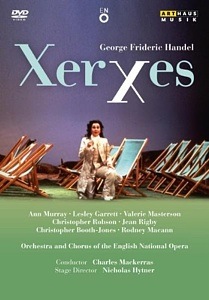
Nicholas Hytner’s much-travelled and well received 1985 production of George Frideric Handel’s 1738 opera Xerxes has been released on DVD
from Arthaus Musik, in a performance recorded live from the English National Opera in 1988. This production features generally fine singing, an interesting and clever production, and superb stage direction by Hytner that allows all the varied emotional and delightful aspects of this unusual opera seria to come to vivid life.
For a non-Handelian like me, this DVD makes an excellent case for Xerxes. The seemingly endless da capo arias that one associates with Handel opera are much reduced here; many of the arias and recitative moments are brief, to the point, and move the story forward clearly. In this piece, Handel interspersed numerous buffo moments into the opera seria form, offending his original audience. The result is a charming mix of comedy and poignancy with moving moments shifting seamlessly to delightfully romantic comic moments.
Hytner’s steady direction uses these shifting moments to change mood and emotion without ever seeming to jar. It is a rich and satisfying mixture. Even the endlessly ornamented vowels (“He spurns me, he spurns me, he spur-hu-hu-hu-hu-hu-hu-hu-hu-hu-hurns me”) are executed with meaning and emotional clarity. The coloratura advances the meaning.
While ostensibly set in Persia in 480 BC, this production could just as well be set at an English country estate, sort of Iran meets Downton Abbey. Aside from one rather desolate palmed landscape and a few ancient statues, the setting is lush and green and florid. Costumes for the principal characters are luscious and of indistinguishable period, though they most closely resemble 19th century Britain with a few exotic middle Eastern touches. The chorus is dressed entirely in beige and servants in black with stark white make-up; this makes a striking contrast to the brightly dressed principal characters.
Xerxes is a strange comic/tragic/romantic hybrid featuring mismatched lovers, passionate romantic intrigue, and a few political/military moments thrown in for good measure. King Xerxes and his brother Arsamenes are both enamored of the lovely Romilda, daughter of the victorious general Ariodates, but Romilda is devoted to Arsamenes and rejects the King’s advances. Alas, her sister Atalanta also is in love with Arsamenes, and plots to find a way to steal him from her sister. And then there’s Amastris, Xerxes’ lover who disguises herself as a soldier to try to regain the King’s affection. There is also a completely buffo stock character, Elviro, the comic servant to Arsamenes. It is to Hytner’s credit that this production is entirely clear, making the convoluted plot easy to follow.
Mezzo-soprano Ann Murray completely inhabits the title role, and sings with authority and grace throughout. From her first moment singing the sumptuous “Ombra mai fu” (here translated to “Under thy shade”), she takes command of the stage and never lets go. She is remarkably versatile in the role, able to navigate the changing emotion of Xerxes with ease and power. The role contains elegance, wistfulness, passion, fury, jealousy, and romance, and Ms. Murray finds them all. Every moment is fearlessly and beautifully sung.
Valerie Masterson seems a bit long in the tooth for Romilda, but she sings the role ably and charmingly though the voice turns shrill in the highest range. Masterson (and indeed the entire cast) has strong coloratura skills and splendid acting moments with fine comic timing. The same can be said for Lesley Garrett’s Atalanta, though she too sounds uncomfortable in the top notes and occasionally crosses the comic line into cutesiness. Jean Rigby gives a strong performance as Xerxes’ rejected lover Amastris, equal parts poignant and furious.
The male cast impresses much less. Christopher Robson’s counter tenor turns sour, thin, and reedy, and he never manages to convince as the man both sisters are swooning about. The Elviro of Christopher Booth-Jones garners some lowbrow laughs, but seems vocally uncomfortable throughout. Rodney Macann as the General Ariodates seems a refugee from Gilbert and Sullivan and could use a lot more restraint in his farcical mugging.
Even with a few less-than-stellar performances, this is a musically and dramatically splendid production, amusing yet elegant. Handel’s glorious music is never sublimated to the production, and even this 186 minutes of music moves nimbly and never bores. Sir Charles Mackerras leads a sparkling orchestral performance from the Orchestra of the English National Opera, and the neutrally-dressed chorus sings in superb co-ordination.


























Comments